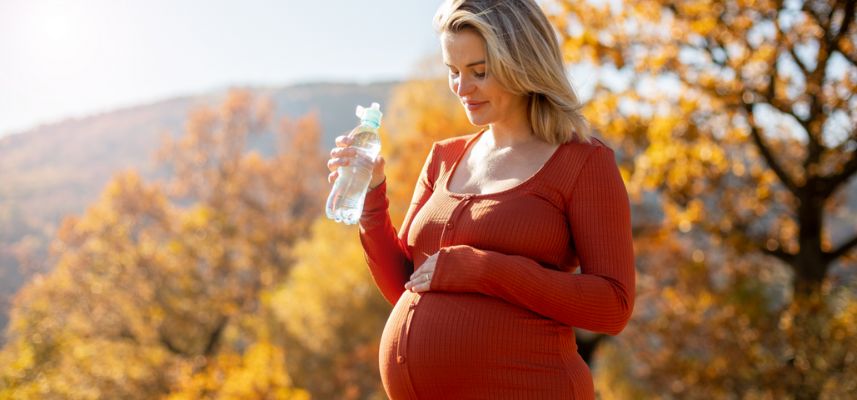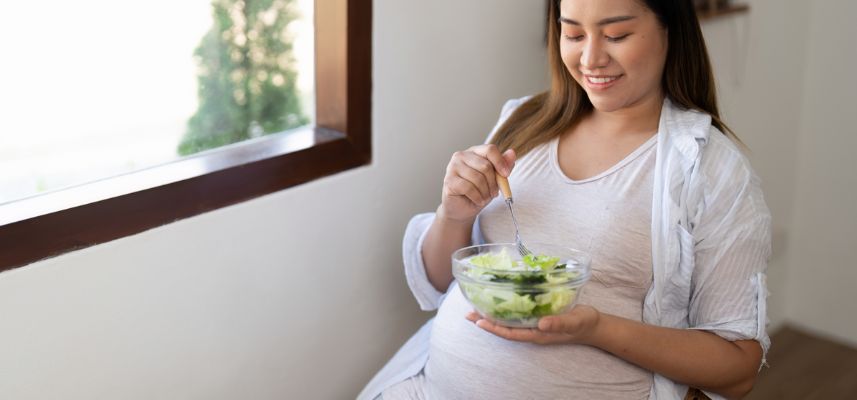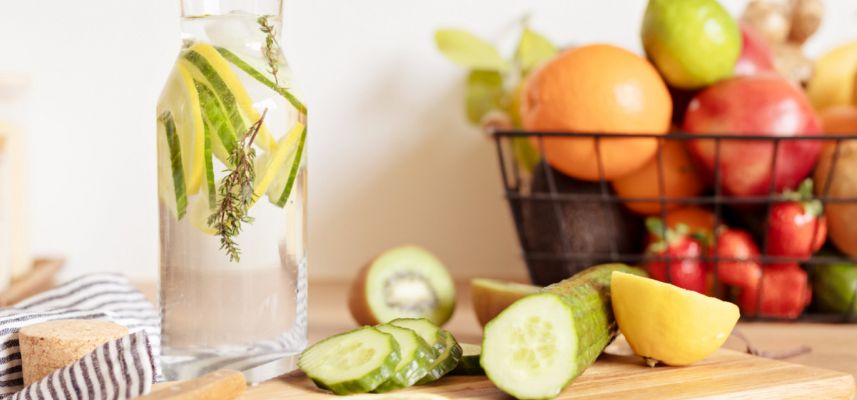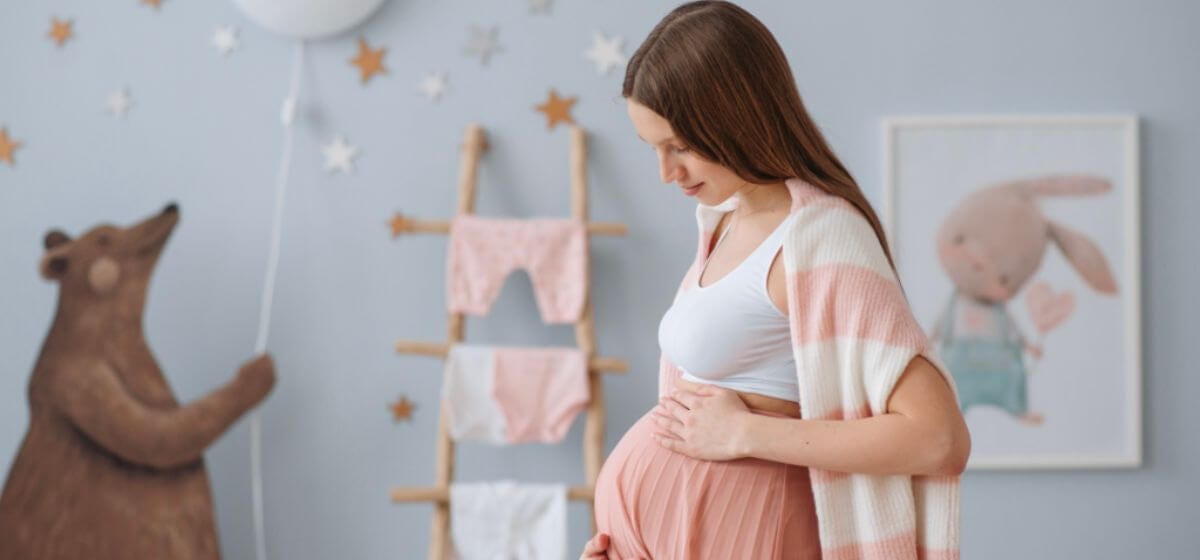Pregnant women should aim to drink at least 10-12 glasses (80-96 ounces) of water daily—significantly more than the 8 glasses recommended for non-pregnant women! Hydration during your pregnancy supports fetal development, helps create amniotic fluid, and reduces the risk of pregnancy complications. Signs of adequate hydration include pale yellow urine and minimal thirst.
Wondering about proper hydration during pregnancy? You're not alone! A recent study found nearly two-thirds of women are unaware of prenatal hydration recommendations. Drinking enough water while pregnant is critical as your body works to support you and your growing baby, so your water intake should increase quite a bit!
In this guide, we'll help you understand how much water you should consume daily during this time and why adequate fluid intake matters for a healthy pregnancy.
IN THIS ARTICLE:
How Much Water Should a Pregnant Woman Be Drinking a Day?
Why Am I So Thirsty While Pregnant?
How to Tell if You're Dehydrated While Pregnant
What Happens if You Don't Drink Enough Water During Pregnancy?
Best Hydration Drinks and Foods for Pregnancy
Practical Tips for Staying Hydrated During Pregnancy


How Much Water Should a Pregnant Woman Be Drinking a Day?
Breast milk naturally changes throughout your breastfeeding journey, and each stage has characteristic colors:
According to Theresa Moutafis, BSN, RN, IBCLC, Lactation Consultant at Aeroflow Breastpumps, "Pregnancy dramatically increases fluid requirements. The body produces additional blood volume, creates amniotic fluid, and supports placental function—all requiring adequate water intake throughout the entire pregnancy."
Are 2 Standard Water Bottles a Day Enough for a Pregnant Woman?
No, a standard plastic water bottle is 16.9 ounces. So, 2 water bottles would be 33.8 ounces of water a day. That amount falls well below the recommended intake for non-pregnant women and the 64-96 ounces needed during pregnancy. If you're only drinking a couple of bottles of water daily while pregnant, you may experience mild dehydration and could face higher risk of pregnancy complications.
Why Pregnant Women Need More Water
Pregnancy increases your body’s fluid needs to support both you and your baby. Staying hydrated helps your body carry out critical functions across all trimesters.
Supporting Your Baby’s Development
-
Amniotic fluid production: By weeks 34-36, your body produces around four cups of amniotic fluid to cushion and protect your baby.
-
Nutrient circulation: Water helps transport essential nutrients from you to your growing baby
-
Blood volume expansion: Blood volume increases by up to 45% during pregnancy, requiring more fluids for proper circulation.
Additional Benefits for Mom
-
Prevents urinary tract infections
-
Reduces constipation and hemorrhoids
-
Supports healthy body temperature regulation
-
Boosts energy levels and reduces fatigue
-
Aids in nutrient absorption of water-soluble vitamins
-
Prevents kidney stones
-
Reduces swelling in feet and ankles
Theresa explains, "Water serves as the foundation for virtually every pregnancy-related bodily function. From creating your baby's protective environment to helping your body adapt to pregnancy changes, adequate fluid intake cannot be overlooked."


Why Am I So Thirsty While Pregnant?
Are you feeling extra thirsty while pregnant? That’s completely normal! Your body’s fluid needs increase for several reasons:
-
Higher metabolic demands: Your metabolism speeds up, requiring more fluids
-
Blood volume expansion: Increased blood volume during pregnancy requires extra water for proper circulation
-
Hormone changes: Pregnancy hormones affect fluid balance and thirst regulation
-
Growing baby's needs: Your developing baby relies on your fluids for healthy growth.
-
Body temperature regulation: Pregnancy can cause slight increases and fluctuations in body temperature, which can make you feel more thirsty.
Frequent thirst, especially during the first trimester and third trimesters, is your body telling you it needs additional fluids!
Tip: If you’re still thirsty after increasing your water intake, check in with your healthcare provider to rule out any underlying issues.


How to Tell if You're Dehydrated While Pregnant
Recognizing dehydration during pregnancy is important for both your health and your baby's well-being.. Watch for these signs:
Early Signs of Mild Dehydration
-
Dark yellow urine (aim for pale yellow)
-
Frequent thirst
-
Dry mouth, lips, or mucus membranes
-
Fatigue and low energy levels
-
Headaches
-
Dizziness or lightheadedness
Signs of Moderate to Severe Dehydration
-
Very dark or amber-colored urine
-
Extreme thirst that doesn't improve with drinking fluids
-
Rapid heartbeat or low blood pressure
-
Mental confusion or "brain fog"
-
Swollen feet and ankles (edema)
-
Constipation or hemorrhoids
-
Decreased fetal movement
Pro tip: Monitoring your urine color is one of the easiest ways to check hydration.. Clear to pale yellow generally indicates good hydration, while darker colors can be a warning sign.
What Happens if You Don't Drink Enough Water During Pregnancy?
Dehydration is common during pregnancy, and a day or two of drinking less than usual is usually not dangerous. However, severe or prolonged dehydration can lead to complications for both you and your baby. Knowing what to watch for is key.
Maternal Complications
-
Low amniotic fluid (oligohydramnios)
-
Preterm labor or delivery
-
Increased risk of urinary tract infections
-
Kidney stones formation
-
Challenges preparing for milk production
-
Braxton-Hicks contractions
Fetal Complications
-
Neural tube defects
-
Other birth defects
-
Poor fetal growth
-
Increased risk of pregnancy complications
Does Dehydration Affect Baby’s Movement?
Yes, dehydration can reduce fetal activity . When your fluid levels drop, your baby may become less active because blood flow and oxygen delivery decrease.
What to do: If you notice reduced fetal movement, drink water, rest, and contact your healthcare provider if your baby’s activity doesn't improve within a couple of hours. Kick counts are a great way to reassure yourself that your baby is doing well, ideally 10 movements within 2 hours.


Best Hydration Drinks and Foods for Pregnancy
What Is the Best Drink for Hydration during Pregnancy?
Plain water is the optimal choice for staying hydrated, but that doesn't mean giving up variety! Here are several alternatives that can contribute to your daily fluid intake:
Recommended Pregnancy Drinks
-
Water (still the best!)
-
Sparkling water (unsweetened)
-
100% fruit juice (in moderation)
-
Low-fat milk
-
Smoothies with fruits and vegetables
-
Coconut water (natural electrolytes)
High-Water Foods That Help Hydration
Did you know many foods can supplement fluid intake? It’s true! Try adding any of the following tasty treats into meals and snacks for a hydration boost!
-
Fruits: Watermelon, cantaloupe, oranges, berries, grapes
-
Vegetables: Cucumbers, lettuce, celery, tomatoes, bell peppers
-
Other options: Soups, broths, yogurt, popsicles
You can find more healthy recipes to support your pregnancy and postpartum lifestyle on our blog!
Drinks to Limit or Avoid During Pregnancy
Not every beverage counts toward hydration. Here’s what to limit or skip:
-
Caffeine: Coffee, energy drinks, and some teas act as diuretics. Limit to <200 mg per day (the equivalent of one 12-ounce cup of regular coffee)
-
Alcohol: There is no safe amount of alcohol you can consume during pregnancy
-
Sugary sodas: These drinks add empty calories and may contribute to gestational diabetes
-
Drinks with artificial sweeteners: Some may cause digestive upset —check labels carefully


Practical Tips for Staying Hydrated During Pregnancy
Daily Hydration Strategies
-
Carry a large water bottle with you throughout the day (some brands even include time markers on the bottles to help you track water consumption throughout the day!)
-
Set reminders to sip water throughout the day
-
Drink a glass of water before each meal
-
Add e lemon, cucumber, or berries for flavor
-
Monitor urine color (pale yellow = hydrated)
-
Drink extra fluids during hot weather or with exercise
Managing Hydration Challenges
For Morning Sickness:
-
Sip small amounts of water frequently rather than large quantities
-
Try ice chips or popsicles if water causes nausea
-
Consider ginger tea to relieve nausea while maintaining fluid intake
For Frequent Urination:
-
Keep drinking—even if it means extra trips to the bathroom
-
Reduce fluid intake close to bedtime, only if sleep disruption becomes problematic
-
Remember: frequent urination is normal during pregnancy!
When to Increase Water Intake
Certain situations may require you to drink even more water during pregnancy. Keep these points in mind:
-
Traveling to or living in hot climates or spending time outdoors in the heat
-
Exercising or engaging in physical activity
-
Experiencing illness with fever
-
Morning sickness with vomiting
-
Living in or traveling to areas with a high altitude
Can You Drink Too Much Water While Pregnant?
Yes—although rare, overhydration can cause low sodium (hyponatremia). Signs include:
-
Headaches, nausea, confusion
-
Muscle weakness or cramping
-
Seizure (in severe cases)
Best practice: sip water steadily throughout the day instead of chugging large amounts at once.
Is Tap Water Safe During Pregnancy?
Most municipal tap water is safe for pregnant women, but consider these precautions:
-
Check local water quality reports for contaminants
-
Use filtered water if concerned about heavy metals (lead, mercury, arsenic)
-
Choose bottled water when traveling or if local water quality is questionable
-
Avoid well water unless recently tested for safety
When to Contact Your Healthcare Provider
Call your provider if you experience the following symptoms:
-
Signs of severe dehydration despite increased fluid intake
-
Persistent vomiting preventing adequate hydration
-
Decreased fetal movement
-
Symptoms of overhydration
-
Concerns about water safety
Bottom Line: Stay Hydrated!
Drinking enough water during your pregnancy supports healthy fetal development, prevents pregnancy complications, and can help you feel your best throughout pregnancy. It's important to monitor your hydration levels daily by checking urine color and listening to thirst cues, while avoiding beverages that can contribute to dehydration.
Remember your hydration needs may vary based on individual factors like body weight, activity level, climate, and overall health. Consult with your healthcare provider for personalized guidance and questions about hydration requirements or concerns. For additional pregnancy nutrition and health guidance, connect with Aeroflow Breastpumps' team of certified lactation consultants and maternal health specialists. Our experts can provide evidence-based support throughout pregnancy and beyond!







